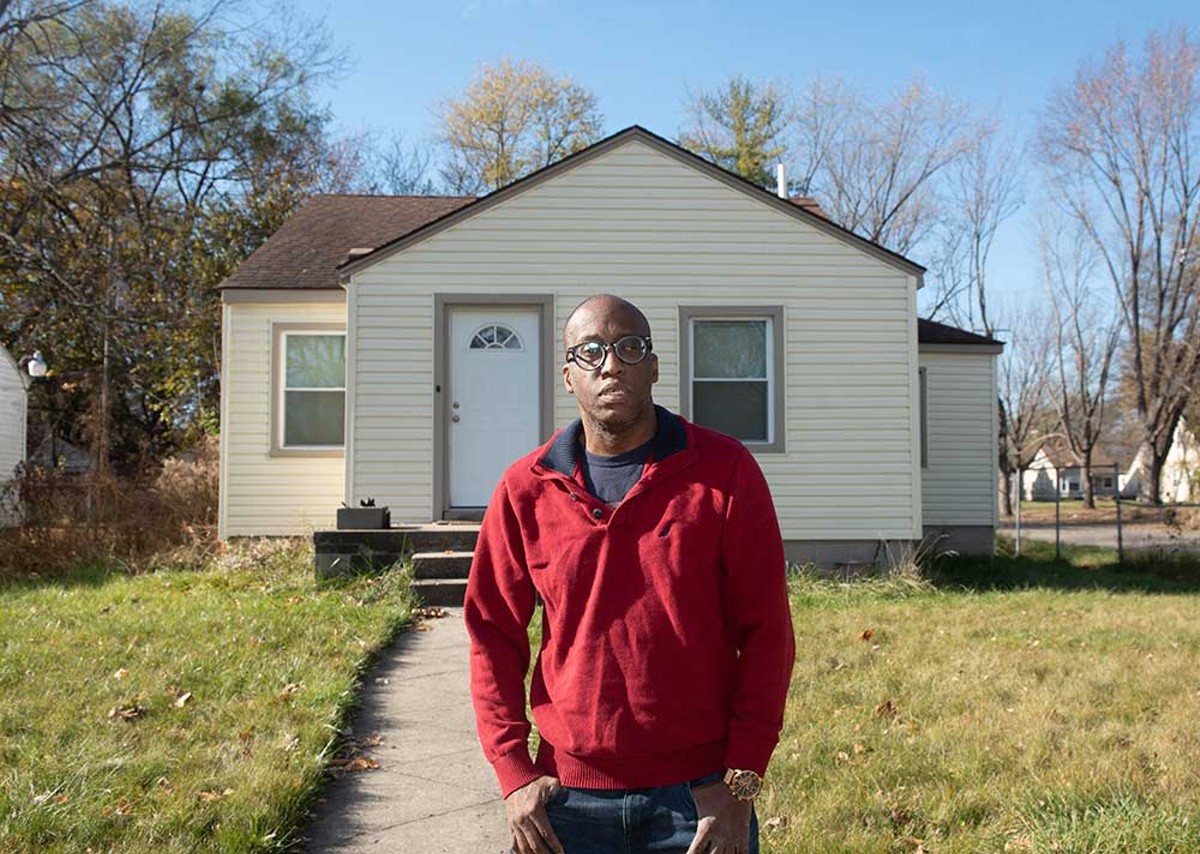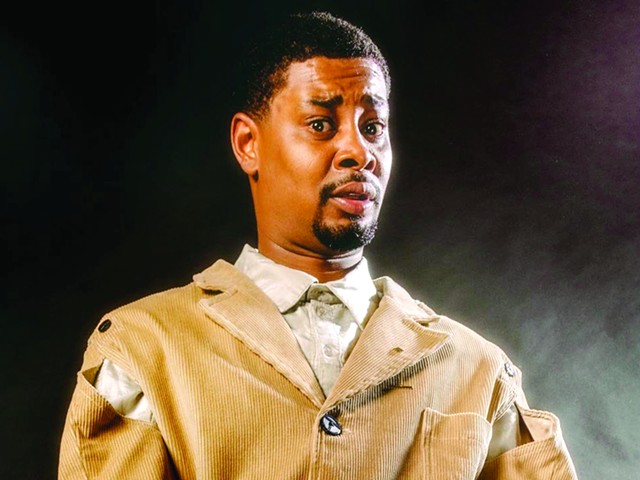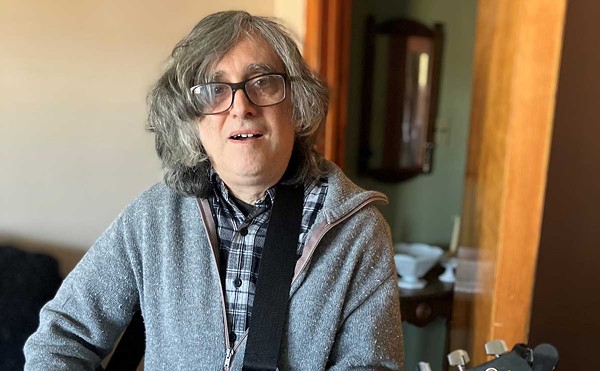On a recent autumn day, Jerry Flynn Dale cleans up the front of his Def Sound Studio at 18315 Winthrop Ave. on Detroit’s west side, cutting down bushes and gathering junk mail and weekly sales flyers from nearby stores.
“They wanted to know why I don’t have the address up here, but it’s a private studio, so what do they expect,” he says.
The home is Dale’s former residence and a critical launching pad of Detroit hip-hop, where everyone from Smiley, George Clinton Jr., Street Lordz, and a young Kid Rock (just to name a few) have laid down tracks over the years. On Nov. 9, several of Dale’s collaborators and friends came out to support him as he appeared in front of the Detroit City Council Historic Designation Advisory Board.
The quest for historic designation for Def Sound Studio has been in the works for nearly a decade. It would be the first hip-hop venue to receive such an honor in Michigan, and the third studio (United Sound Systems and Motown’s Hitsville U.S.A. being the other two) to do so. There are two more public hearings slated, with final approval from City Council pending.
“In 2015 a lot of people came to me and said, ‘This is a historical landmark. All our history of us recording in Detroit is here in your house,’ so that’s what got the process started,” Dale says.
Music has been in Dale’s DNA since he was a toddler. He grew up next door to the 1970s funk and R&B band Raydio, whom he formed a connection with. The friendship was Dale’s first source of inspiration but also allowed him to get first-hand knowledge of instruments and recording equipment. While other kids wanted to play sports after school, Dale only wanted to learn about music.
“I was at their rehearsals when I was 3 years old,” Dale says. “So I knew I was going to be an engineer and do music very early. They were the catalyst to me getting this going.”
“We were a good circle of family and friends kind to each other,” says Raydio’s Arnell Carmichael. “I wasn’t going to blow his dreams by not telling him info, news, and inside stories about Raydio. He wanted to be in the music business. Never thought he would become an engineer and achieve what was about to happen.”
At the time, Detroit was still feeling the effects of the 1972 departure of Motown Records, which left its namesake for Los Angeles. The city felt like it had lost its voice, and longtime music enthusiasts were slow to embrace hip-hop, which had sprouted up in New York in 1973. But Dale embraced the new genre early on and sought to interact with it anywhere he could.
“I wanted to be a rapper back then,” he says. “I used to walk up to Future Funk Records down the street from where the Hip-Hop Shop eventually opened up. Carl Mitchell used to record us.”
By the mid-’80s, a teenaged Dale had built a studio in his home and was also sharpening his engineering skill set by working at Sound Suite Studios on Puritan Street. Sound Suite was legendary in its own right as it commonly hosted recording sessions for the likes of Aretha Franklin, Bob Seger, and the Dramatics.
“I was an apprentice. I cut my teeth at Sound Suite with celebrities and brought it back to the hip-hop community,” Dale says.
Detroit hip-hop was still in its first era and most studios didn’t offer studio time to hip-hop artists. The genre wasn’t yet widely understood or respected. A lot of studio owners felt the street violence that could flare up at hip-hop parties and concerts would carry over to recording sessions.
“No one could get in the studio, studios were on lock,” Dale says. “I was told we don’t record rap here. Rappers were considered dangerous. Nobody knew how a rapper would respond or react in a professional environment.”
“Trying to get into the studio to record our new genre of rap was like waiting for an airplane at a marina,” says former rapper Kalimah Johnson (who was known as Nikki D, later changed to Eboni and Her Business). “A few times, I was even told by several musical greats from two different genres to just give up trying to rap because it would not be around long.”
Of course, that wound up not being the case, with hip-hop going on to become a cultural force the world over and the genre celebrating its 50th anniversary this year.
Dale named his home studio Def Sound Studios, which became Detroit’s first hip-hop studio. His engineering expertise proved to be critical for the success of Def Sound as he was able to bring an industry standard competency to recording. Def Sound was also a meeting place for fellow hip-hop artists looking for kinship.
“Def Sound Studio for me was a safe place, officially none of my music came out of that studio except for when Jerry and I were in our teens and he had that four-track sitting on the fold-up dinner table,” adds Johnson.
By 2004 Dale began to limit the amount of studio sessions he booked for Def Sound as he pivoted to pursue other business ventures. By then the stigma of offering rappers studio time had diminished, and home studios were becoming more and more common. But Dale’s legacy and contribution had been cemented. He gives a lot of that credit to Detroit’s musical artists and executives of yesteryear for support and coaching. Berry Gordy’s niece Roxanna Gordy served as Dale’s personal manager for many years, and her father Robert Gordy was a longtime mentor to Dale.
“A lot of rappers have a misconception of the Gordy family… they showed me how to be a professional, how to deal with artists,” Dale says. “There were real teachable moments. I would be sitting there talking to Berry Gordy’s brother Robert and he would be guiding me in life, music.”
“It means the world to me to see this day and time come to reality for Def Sound and my little brother Jerry Flynn Dale,” says Al Hudson, aka Mr. Grove from the funk band One Way. “We opened the doors to him while recording and he took full advantage to learn.”
Dale adds, “When I was younger I wanted to be like Berry Gordy, I wanted to make records, I wanted to continue the great sound of Motown to where we’re at now, and thank God I was able to do it.”
Correction: An earlier version of this article erroneously reported that the historic designation for Def Sound Studio had been granted. In fact, there are two more public hearings slated, with final approval from City Council pending.
Subscribe to Metro Times newsletters.
Follow us: Google News | NewsBreak | Reddit | Instagram | Facebook | Twitter







